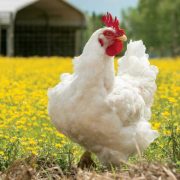Knickers the Giant Steer Is Too Big to Eat, but All His Friends Will Die
Cows (and steers) are awesome and have the ability to experience a plethora of complex emotions. These gentle giants cherish their friends and mourn the deaths of loved ones. They may even shed tears when they suffer a loss.
So while it’s wonderful that the life of Knickers—the massive steer who has become a recent internet sensation—has been spared because of his gargantuan size, it’s horrible that his friends’ throats will eventually be slit in a slaughterhouse.
It’s obvious that Knickers has a rich social life. The herd he lives with on a Western Australia farm follows his every move. As farm owner Geoff Pearson says, “They all look up to him … wherever, whenever [he] moves, they move … he’s … the leader of the pack.”
A herd of cows is very much like a pack of wolves, with alpha animals and complex social dynamics. Cows can recognize more than 100 members of a herd, and social relationships are very important to them. They consistently choose leaders for their intelligence, inquisitiveness, self-confidence, experience, and good social skills, while size and strength aren’t considered and tendencies to bully and be selfish aren’t recognized as suitable qualities for leaders.
Cows Are Someone, Not Something
Sure, it’s not every day that you see a cow who’s 6 foot, 3 inches and 3,000 pounds walking around. But just like dogs, cats, and humans, every cow is unique. Some learn quickly, while others take their time. Some are bold and adventurous, while others are shy and timid. Some are friendly and considerate, while others are bossy and devious. They’re even known to hold grudges against other cows who treat them badly.
Cows are friends, not food 💗 pic.twitter.com/ujENDhV21X
— PETA: Bringing Home the Bagels Since 1980 (@peta) March 4, 2017
Like all animals—including the ones reading this—cows value their own lives and don’t want to die. Stories abound of those who have gone to extraordinary lengths to survive. All of them deserve to live in peace, just like Knickers.
All cows are special—save as many as you can by going vegan today!
By living vegan, you can ensure that nearly 200 animals a year don’t end up on dinner plates. And that’s not to mention those who will be spared suffering and death in experiments and for the clothing and entertainment industries.
Click the button below to order a free vegan starter kit filled with recipes, shopping tips, and everything else that you’ll need to start your vegan journey:


